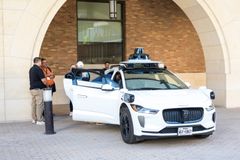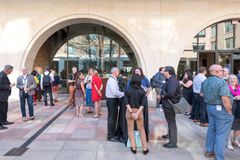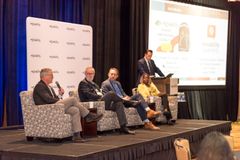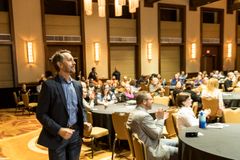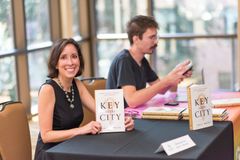TEXAS' BIGGEST TRANSPORTATION THOUGHT LEADERSHIP EVENT: the Movability Summit
This full-day event brings together industry, community, and government leaders to share emerging ideas and best practices in transportation demand management, reducing congestion, land development, and the role mobility plays in enhancing economic development and job access. The 2026 Movability Summit will take place on Sept. 11, 2026 at the AT&T Hotel and Conference Center in Austin, TX.
Summit attendees can expect:
- Keynote speaker and concurrent panel sessions
- Plated lunch for all attendees
- Refreshments throughout the day
- Vendor booths
- Autonomous Vehicle Petting Zoo
- Post-event reception: open bar, cash bar, & hors d’oeuvres
- Exclusive Pre-dinner reception (limited to sponsors and speakers)

The 2026 Movability Summit Keynote speaker will be Jeffrey Wood, owner and operator of The Overhead Wire Daily, a 20 year old newsletter and archive focused on sharing information about cities around the world with advocates, elected leaders, researchers and interested parties.
He is also the host of Talking Headways, the longest running podcast about transportation and cities in the United States. Before launching The Overhead Wire, Jeff was the New Media Director and Chief Cartographer at Reconnecting America and the Center for TOD. Jeff led data analysis and cartography work as well as research on transit modes and was responsible for the best practices database funded by the Federal Transit Administration.
If you are planning to submit a proposal for the 2026 Movability Summit, please read this document for instructions and a link to the application!
Sponsorships
Bronze: $1,000
- Movability "likes" your organization's Facebook, Twitter, LinkedIn pages
- Recognition on Movability sponsor page & event page (listing only)
- Recognition in monthly Get There News & Member Lane newsletters (listing only)
- Listing in event program
- Listing on event on-site signage
- Sponsor ribbon on event badges
- 2 event badges* Bronze-level benefit only
- Listing recognition on screen before every panel in addition to main ballroom
Fill out the sponsorship form here
moreSilver - 8 available: $2,500
- BRONZE-LEVEL BENEFITS, PLUS:
- Recognition on Movability sponsor page & event page (listing and link)
- Logo on event on-site signage
- Recognition in monthly Get There News & Member Lane newsletters (listing and link)
- Membership credit up to LARGE-level membership for 1 year (non-stackable credit)
- 4 event badges * Silver-level benefit only
- Opportunity to promote your organization at the vendor area OR the demo area (first come, first served)
Fill out the sponsorship form here
moreGold - 5 available: $5,000
- ALL SILVER LEVEL BENEFITS, PLUS:
- Recognition on Movability sponsor page & event page (logo)
- Sponsor highlight on Movability social media
- Logo in event program
- HALF page B&W ad in Invitational program (distribution = 250)
- Verbal recognition of your sponsorship during the Opening Session
- Logo recognition on screen before every panel in addition to main ballroom
- Opportunity to show a video PSA at the start of a breakout panel (30 seconds)* Gold-level benefit only
- 10 event badges * Gold-level benefit only
Fill out the sponsorship form here
morePlatinum - 3 available: $7,500
GOLD-LEVEL BENEFITS, PLUS:
- First Come First Served Recognition Options: (Choose 1)
- Raffle drawing sponsor recognition and opportunity to lead the drawing* Platinum-level benefit only
- Recognition as sponsor of the Post-Summit Reception, with speaking opportunity* Platinum-level benefit only
- Recognition as sponsor of the Welcome Dinner, with speaking opportunity* Platinum-level benefit only
- Recognition as sponsor of networking break refreshments* Platinum-level benefit only
- Opportunity to publish up to four (4) articles in Movability newsletters a year
- Membership credit up to ENTERPRISE-level membership for 1 year (non-stackable credit)
- Clickable rotating banner on event page (720 pixels x 300 pixels)* Platinum & Presenting level benefit
- FULL page B&W ad in Invitational program (distribution = 250)
- Reserved table with logo centerpiece recognition at the event + 10 badges * Platinum & Presenting level benefit
Fill out the sponsorship form here
morePresenting - 1 available: $15,000
PLATINUM-LEVEL BENEFITS, PLUS:
- Speaking Opportunity – OR – video PSA at the Opening and Closing Sessions
- Full page COLOR ad on back cover of program (distribution = 250)
- Logo on program cover
- Logo on event name tags and badge lanyards
- Recognition as part of the Leadership Circle everywhere Founding Members are recognized for an entire year
- List of event attendees
- Movability membership at ANY level for 1 year
Fill out the sponsorship form here
moreTHANK YOU TO OUR 2026 Summit SPONSORS
PLATINUM
GOLD
SILVER
See all the Summit 2025 photos here
